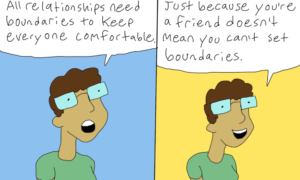
A gray-and-white illustrated devil against a light yellow background has a speech bubble with a question mark
I just did a radio show.
I was asked to come on to talk about street harassment. More specifically, I was asked to discuss this article I wrote on “tatcalling,” or the experience of my tattoos being used as supposed invitations for catcalling (an article that I think people loved, by the way, based on the number of death threats I received post-publication).
So I already knew exactly what to expect.
After being asked a few broad-sweeping questions that repeatedly prompted me to address the oft-claimed defense that street harassment is “just a compliment” (and, uhh, being told that my last name “sounds made-up”), the host specifically asked for other tattooed women to call in and discuss their experiences with their body art and street harassment.
So I really wasn’t surprised when the first call answered was from a dude.
This gentleman claimed, essentially, that this “new wave” of feminism is too sensitive in its insistence that our “personal lives” and experiences have sociopolitical significance.
His argument was that not every situation can be tied back to structural oppression, and that my point about how so-called “harmless compliments” are actually indicative of just how much women’s bodies are not respected in public spaces was absurd.
Then he called me “entitled” – which is funny because he’s the one who took “Tattooed women, call in and share your experiences” to mean, “Random men, let us know your thoughts!”
And I know exactly why he called, why he felt so compelled to share his unoriginal thoughts.
He just wanted to oh-so-importantly give us “the other side of the story,” since my stance was “one-sided” and “slanted.” He just wanted to “intelligently, rationally debate” this topic that he has zero experience with – by letting me know that I’m wrong.
Because, ya know, we so desperately need to know what men think about women’s lives, particularly in regards to how our pain isn’t valid and how a little bit of “common sense” will help us understand just how not oppressed we are – otherwise we’re being misandrist feminists who are only interested in echo chambers and yes men.
Right.
But maybe I’m being unfair. Maybe I really am being “too sensitive.” After all, he was just playing devil’s advocate to my point, right? I mean, why wouldn’t I be grateful for some perspective that I have probably never considered before in my entire life?
If you’re a feminist who spends any amount of time on the Internet, you know exactly what I’m talking about: You post that article about the wage gap on Facebook, and all of a sudden, all of these cis, white, straight dudes come out of the woodwork to remind you that the statistics are faulty, that women take more time off of work, that women just don’t like STEM fields – all under the guise of “playing devil’s advocate” – as if you’ve never heard these arguments before.
And it is a guise.
Because most people who play devil’s advocate (a legitimate debating tool where one speaks for a perspective not currently present in an attempt to get someone else to, after taking into consideration this new information, reconsider their viewpoint) with feminists aren’t actually doing that at all.
So, just in case positioning oneself as legal counsel to Satan isn’t concerning enough, I want to lay out why, especially as feminists and social justice advocates, we roll our eyes at so-called “devil’s advocacy.” We know that in reality, you’re actually probably just about to do one of these four things.
1. You’re Regurgitating (And Reinforcing) the Common Status Quo
What’s amusing about the aforementioned man calling into that radio show to make his case is this: The bulk of the interview thus far had been the host telling me what men tend to think about women’s discomfort with street harassment.
That means that I spent a lot of time offering my rebuttal, backed up by both feminist analysis and lived experience – neither of which most men who refute the notion of street harassment as offensive have.
And then this fellow called in to… repeat… all of those positions.
This man – who I think thought he was acting as some kind of hero to mankind – called in to regurgitate the stances that I had already rebuked.
And those stances – the popularly accepted viewpoints on any given topic – are known as “the status quo.”
When sociologists use the term “status quo,” what’s being referred to is the currently existing social structures and values of any given culture at any given time. It’s basically the generally established “way that things are.”
The work of most feminists and other anti-oppression activists is to challenge the status quo, or push society to reevaluate the “way that things are,” notice the ways in which they’re harmful, and work to eradicate them.
So when you “play devil’s advocate,” you’re quite literally repeating the status quo, telling us stuff that we already know – because not only do we, too, live in this space and time and therefore comprehend the norms of this cultural and historical place, but we also are actively thinking outside of that box, which first requires us to know that box really, really well.
And you’re not-so-radically reinforcing that we should remain in that box.
That is: You’re not saying anything enlightening. You’re basically responding to our asking “But what if 2 + 2 could equal 5?” with “I’m just playing devil’s advocate here, but 2 + 2 equals 4.”
2. You’re Disrespecting Our Critical Thinking Skills
Whenever someone responds to my critique of the culture in which we live with what they believe to be a deep conundrum or contradiction, my first thought is, “Wow. You have absolutely no respect for me as an intellectual being.”
Now, I’ll be the first to say that I don’t think we should value intellect (and particularly the narrow definition that we allow for it) as a trait (hi, that’s ableist) – and yes, I know that you devil’s advocates out there want to argue that intellect and its associated innovation is valuable to the propagation of our species – but I do think that we should respect one another for whichever ways our smarts show up for us.
For some of us, smarts show up in our critical analysis skills, or our abilities to analyze, evaluate, reconceptualize, and communicate ideas.
And when you regurgitate the status quo to us – reestablishing the norms that we’re trying to move past by interrupting our thought processes in asking us to reconsider ideas that we’ve already contemplated deeply – you’re signaling to us that you don’t trust our ability to think critically.
Oftentimes, what makes this even more frustrating is that the suggestion is because we’re of the identities to which we’re speaking (like women talking about women’s experiences), our stances are inherently slanted.
You withhold trust in our ability to rationalize because you assume that our points of view are influenced by our experiences – as if your perspectives aren’t equally slanted by yours.
Here’s a frustrating news flash for devil’s advocates: There is no such thing as an unbiased opinion. It can’t exist because we all bring values to the table when we try to solve a problem “objectively.”
So are feminists biased? Women? People of color? Yes. We (and they) are.
But what makes you assume that the perspective of, for example, a white man isn’t biased, isn’t affected by your social positionality?
I’ll tell you why: It’s because you’re so used to living in a world that affirms and validates your experience as “the way things are” that you’ve never been asked to consider those biases.
It’s because, again, you’re repeating the status quo, which by virtue of its existence goes unquestioned.
And when you assume that our conclusions fell from the sky or came to us magically through the lens of bitter experience, you’re assuming that you’re past falling victim to subjectivity and are therefore the only ones in the conversation who can think critically for yourselves.
3. You’re Positioning Your Thoughts As More Valuable Than Our Lived Experiences
I wish that I was exaggerating here, but in all honesty, a typical Facebook conversation between a feminist and a layperson (especially one who is a straight, cis man) goes like this:
—Street harassment is offensive.
—No it isn’t. It’s a compliment.
—I think that’s up to me to decide. And I don’t take it as a compliment.
—But you should. It’s harmless.
—It’s not harmless. It’s embarrassing, violating, and sometimes even threatening.
—That’s ridiculous. You should be flattered.
—But I’m not. It frustrates and offends me.
—Please. Women love it when men tell them that they’re beautiful.
At which point, up to a dozen other women will comment, explaining why street harassment hurts them, even going so far as to link to more stories and research to support their stances. Even some feminist-minded dudes will jump in to try and talk some sense into the offending asshole. But the latter will continue to stand by his opinion, despite the mounting proof that he’s entirely wrong.
I’ve seen this happen – yes, even just around the topic of street harassment, let alone a million other issues – over and over and over again.
What this kind of devil’s advocate doesn’t understand is that his (often unsolicited) opinion on an issue does not trump the lived experiences and valid emotions of the marginalized person’s story – especially when that narrative is a near-universal one.
The truth is, you can’t rationalize your way out of how people experience their existence. Trust me: Sometimes I wish I could change my perspective on something and therefore experience this world in a less terrible way, but I can’t.
Because no matter how many men tell us that their intent in catcalling is harmless, it’s still going to be offensive.
Because your thoughts – no matter how well-intentioned, well-thought-out, or well-researched they are – simply pale in comparison to living in a marginalized body that experiences the trauma of oppression.
It must be glorious to be in such a position of power that you have the privilege to pontificate on the idea of oppression.
But when you interrupt a conversation built on years of experience and synthesizing to add your “devil’s advocate” “two cents” on what you think about it, you’re positioning your five seconds of contemplation as equal to or more valuable than someone’s actual life.
4. You’re Shutting Down a Conversation Instead of Adding to It
I’m going to tell you something that you don’t want to hear (and I know you don’t because when I was learning this, I sure as hell didn’t either): Your opinion doesn’t always matter.
I know that we – and especially those of us in positions of privilege – are taught from a young age that an opinion can’t be right or wrong and that our thoughts about the world are important and worth sharing. But I hate to break it to you: That’s bullshit.
There are times when your perspective on the world will be invaluable – because only you have it in the exact way that you do, and it most certainly has the power to change the world, for better or for worse, in some regard. But that’s not always.
And when your opinion – or what you think is a fascinating new lens through which to see the world – reinforces the status quo, disrespects the person with whom you’re engaging, and takes up unnecessary space, you’re actually not adding to the conversation. You’re shutting it down.
And whether you realize it or not – whether you mean to or not – that’s oppressive as all hell.
So, ya know, just to play devil’s advocate here, I want to give you an idea to chew on: Maybe sometimes, instead of inserting your opinion, it’s better to pay attention to the conversation than to add to it redundantly and reductively.
Now that would make Satan proud.
[do_widget id=’text-101′]
Melissa A. Fabello, Co-Managing Editor of Everyday Feminism, is a sexuality educator, eating disorder and body image activist, and media literacy vlogger based out of Philadelphia. She enjoys rainy days, Jurassic Park, and the occasional Taylor Swift song and can be found on YouTube and Tumblr. She holds a B.S. in English Education from Boston University and an M.Ed. in Human Sexuality from Widener University. She is currently working on her PhD. She can be reached on Twitter @fyeahmfabello.
Search our 3000+ articles!
Read our articles about:
Our online racial justice training
Used by hundreds of universities, non-profits, and businesses.
Click to learn more




















